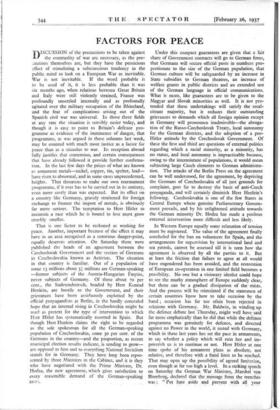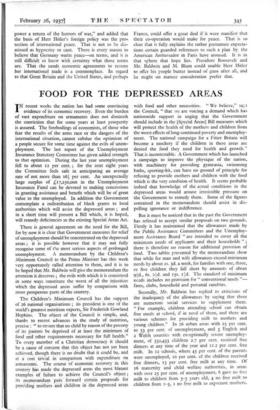FACTORS FOR PEACE
public mind to look on a European War as inevitable. War is not inevitable. If the word probable is to be used of it, it is less probable than it was six months ago, when relations between Great Britain and Italy were still violently strained, France was profoundly unsettled internally and as profoundly agitated over the military occupation of the Rhineland, and the fear of complications arising out of the Spanish civil war was universal. In those three fields at any rate the situation is sensibly easier today, and though it is easy to point to Britain's defence pro- gramme as evidence of the imminence of danger, that programme, as was argued in these columns last week, may be counted with much more justice as a factor for peace than as a stimulus to war. Its reception abroad fully justifies that contention, and certain consequences that have already followed it provide further confirma- tion. In the last few days the prices of what are known as armament metals—nickel, copper, tin, spelter, lead— have risen to abnormal, and in some cases unprecedented, heights. That threatens to make our own rearmament programme, if it ever has to be carried out in its entirety, even more costly than was expected. But its effect on a country like Germany, gravely straitened for foreign exchange to finance the import of metals, is obviously far more serious. The temptation to Herr Hitler to maintain a race which he is bound to lose must grow steadily smaller. • , •
That is one factor to be reckoned as working for peace. Another, important because of the effect it may have in an area recognised as a notorious danger-point, equally deserves attention. On Saturday there were published the heads of an agreement between the Czechoslovak Government and the- section of Germans in Czechoslovakia known as Activists. The situation in that country is familiar. Out of a population of some 13 millions about 31 millions are German-speaking —former subjects of the Austria-Hungarian Empire, never subjects of Germany Of these about 70 per cent., the Sudetendeutsch, headed by Herr Konrad Henlein, are hostile to the Government, and their grievances have been assiduously exploited by the official propagandists at Berlin, in the hardly concealed hope that an internal rising in Czechoslovakia might be used as pretext for the type of intervention to which Herr Hitler has systematically resorted in Spain. But though Herr Henlein claims the right to be regarded as the sole spokesman for all the German-speaking population of Czechoslovakia, some 30 per cent. of the Germans in the country—and the proportion, as recent municipal election results indicate, is tending to grow— are opposed to him and to everything National Socialism stands for in Germany. They have long been repre- sented by three Ministers in the Cabinet, and it is they who have negotiated with the Prime Minister, Dr. Hodza, the new agreement, which gives satisfaction to every reasonable demand of the German-speaking race-J.
Under this compact guarantees are given that a fair share of Government contracts will go to German firms, that Germans will secure official posts in numbers pro7 portionate to the size of the German population, that German culture will be safeguarded by an increase in State subsidies to German theatres, an increase of welfare grants in public districts and an extended use of the German language in official communications. What is more, like guarantees are to be given to the Magyar and Slovak minorities as well. It is not pre- tended that these undertakings will satisfy the recal- citrant majority, but it reduces their outstanding grievances to demands which all foreign opinion except in Germany will pronounce inadmissible—the abroga- tion of the Russo-Czechoslovak Treaty, local autonomy for the German districts, and the adoption of a prd- Hitler attitude by the Czechoslovak Government. Of these the first and third are questions of external politics regarding which a racial minority, as a minority, has no status, and local autonomy is impracticable because, owing to the intermixture of populations, it would mean subjecting large Czech elements to German administra- tion. The attacks of the Berlin Press on the agreement can be well understood, for the agreement, by depriving the Germans of Czechoslovakia of all just grounds for complaint, goes far to destroy the basis" of anti-Czech propaganda, and will certainly diminish Herr Henlein's following. Czechoslovakia is one of the few States in Central Europe where genuine Parliamentary Govern- ment prevails, and by his enlightened attitude towards the German minority Dr. Hodza has made a perilous external intervention more difficult and less likely.
In Western Europe equally some relaxation of tension must be registered. The value of the agreement finally concluded for the ban on volunteers for Spain, and the arrangements for supervision by international land and sea patrols, cannot be assessed till it is seen how the agreement is observed by all the parties to it. But at least the friction that failure to agree at all would have engendered has been avoided, and the restoration of European co-operation in one limited field becomes a possibility. No one but a visionary idealist could hope to see the murky atmosphere of Europe suddenly clear, but there can be a gradual dissipation of the- mists. And the process will be stimulated if the statesmen of certain countries know how to take occasion by the hand ; occasion has far too often been rejected in relations with Germany. Mr. Baldwin, in, winding up the defence debate last Thursday, might well have said far more emphatically than he did that while the detence programme was genuinely for defence, and directed against no Power in the world, it rested with Germany, which in these last years has set the pace in armaments, to say whether a policy which will ruin her and im- poverish us is to continue or not. Herr Hitler at one time spoke of his armament plans as absolute, not relative, and therefore with a fixed limit to be reached. That may open up the .possibility of agreed limitation, even though at far too high a level. In a striking ipeeCh on Saturday the German War Minister, Marshal von Blomberg, declared that the message frOm the trenches was : " Put hate aside 'and prevent with all your power a return of the horrors of war," and added that the basis of Herr Hitler's foreign policy was the pro7 tection of international peace. That is not to be dis- missed as hypocrisy or. cant. There is every reason to believe that GermanY wants peace—on terms, and it is still difficult to know with certainty what those terms are. Thai she needs economic agreements to restore her international trade is a commonplace. In regard to that Great Britain and the United States, and perhaPs
France, could offer a great deal if it were manifest that their co-operation would make for peace. That is so clear that it fully explains the rather premature expecta- tions certain guarded references to such a plan by the American Ambassador in Paris have aroused. It is in that sphere that hope lies. President Roosevelt and Mr. Baldwin and M. Blum could enable Herr Hitler to offer his people butter instead of guns after all, and he might on mature consideration prefer that.



















































 Previous page
Previous page